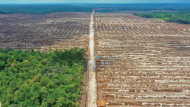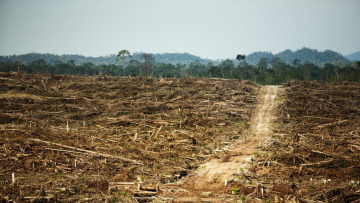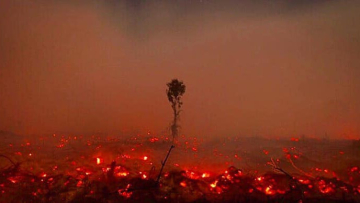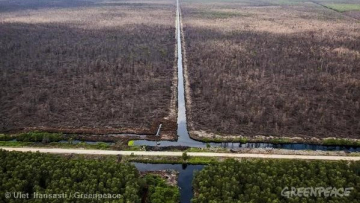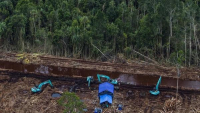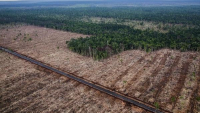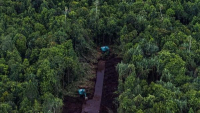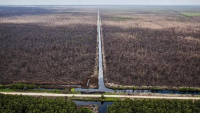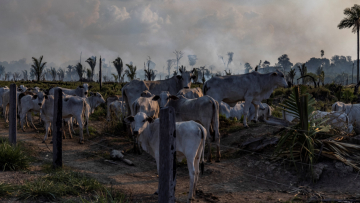
Company – Active
This profile is actively maintained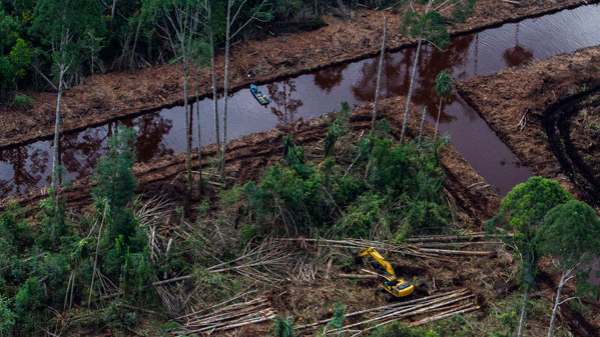
Company – Active
This profile is actively maintainedWhy this profile?
Since its forestry activities started in 1993, APRIL has been involved in hundreds of social conflicts, human rights abuses and environmental disasters. Despite responding to pressure by revising its Sustainable Forest Management Policy in 2015, APRIL has since defaulted on these commitments.
What must happen
Banks and other financial institutions should suspend financial services to APRIL, RGE (APRIL’s corporate owner) and their affiliated entities under common control. They should also refuse to provide any new financing for these companies, their brands or affiliates, until meaningful, all-encompassing changes to business operations have been proven and verified.
| Sectors | Pulp, Paper and Paperboard Mills |
| Headquarters |
|
| Ownership |
APRIL is part of Indonesian business tycoon Sukanto Tanoto’s Royal Golden Eagle Group. RGE is a holding company with interests in the paper, palm oil, construction and energy business sectors. For an overview of other APRIL-associated or Tanoto-controlled companies, refer to the Environmental Paper Network’s forest products database. |
| Subsidiaries |
Asia Symbol – China
Bracell – Singapore Riau Andalan Kertas - Riaupaper – Indonesia Riau Andalan Pulp & Paper (RAPP or Riaupulp) – Indonesia Sateri Holdings – China |
| Website | https://www.aprilasia.com/ |
Asia Pacific Resources International Holdings Limited (APRIL) is Indonesia's second-largest pulp and paper producer (behind APP). Based in Singapore, APRIL is one of Royal Golden Eagle Group’s (RGE) many paper-related subsidiaries. APRIL develops fibre plantations, manufactures uncoated, wood-free paper and is the world’s second-largest producer of bleached hardwood kraft pulp. APRIL’s primary mills are in Indonesia and China and include one of the world’s largest paper mills, Riau Andalan Pulp & Paper in Sumatra. APRIL’s fibre is sourced primarily from Indonesia and Latin America. A variety of brand names are used to sell APRIL’s paper products around the world, including PaperOne, A Plus Paper, Riaupulp Acacia and Tinkle. In addition to its own production, APRIL’s pulp is used by other paper companies in Asia and Europe. The Environmental Paper Network maintains a database of companies directly associated with RGE and APRIL.
Impact on human rights and communities
Child labour was exposed in APRIL’s supply chain by Eyes on the Forest in April 2014. While investigating clear-cutting in Sumatra’s Kampar Peninsula by PT Triomas Forestry Development Indonesia, Eyes on the Forest took photographs of children at work for the APRIL supplier. Such arrangements violate national legislation and international standards.
A multinational public health crisis was triggered partially by APRIL in 2015, following a smoke and haze incident to which the company’s land-clearing activities contributed. APRIL was found to be a main perpetrator of fires that burned a total of 2.6 million hectares in Sumatra, Kalimantan and Papua. The fires consumed plantations, forests and peatlands and the resulting smoke and haze consumed Southeast Asia. National emergencies were declared in Indonesia, Singapore, Malaysia and beyond. The crisis killed 19 people and it was estimated that another 500,000 suffered from respiratory tract infections. In 2015, an investigation into the public health impacts of Indonesia’s 2015 forest fires estimated that 91,600 people in Indonesia died prematurely from fine particle exposure, as well as 6,500 in Malaysia and 2,200 in Singapore.
Land-grabbing from Indigenous people and other forest communities that rely on cultivating rubber, sago and other crops has been an APRIL tactic for years. In 2011, for example, residents of Riau’s Kampar Peninsula and coastal islands resorted to sewing their mouths shut to raise awareness of land grabs by APRIL. Released in June 2015, APRIL Group’s Sustainable Forest Management Policy 2.0 committed the company and its affiliates to resolving its existing social conflicts and to respecting Free and Prior Informed Consent (FPIC) requirements. By September 2016, Eyes on the Forest had reported that APRIL was failing to involve affected communities and other key stakeholders in the identification, analysis and resolution of a Sumatran land conflict. APRIL’s 2017 Sustainability Report identified 880 unresolved land conflicts that its supplier PT RAPP was embroiled in, concerning at least 21,000 hectares of land.
Toba Pulp Lestari (TPL) – another company associated with APRIL via Sukanto Tanoto’s Royal Golden Eagle Group – was at the centre of a land conflict with the Indigenous Batak people in North Sumatra. TPL deprived the Batak people of clean watersheds, shelter, medicine, food and livelihoods by converting their ancestral lands into plantations. In late 2016, TPL was ordered to return 13,000 hectares of ancestral lands to Indigenous communities by the Indonesian government. In early 2024, an indigenous leader was jailed for a conflict regarding ancestral land occupied by APRIL’s sister company Toba Pulp Lestari.
Impact on climate
Massive greenhouse gas (GHG) emissions through peatland destruction is just one consequence of APRIL’s practices. A 2016 Wetlands International report argued against APRIL’s claims that peatland can be drained in a sustainable manner that doesn’t result in long-term GHG drainage. According to a 2012 Biogeosciences field study of APRIL’s concessions in Indonesia, the release of CO2 from an acacia plantation on peatlands has been identified as around 80 tonnes per year, per hectare; in 2017, an Environmental Paper Network study surmised that APRIL's supplier plantations on peat therefore emitted more than 19 million tonnes of CO2 annually, which was more than Slovenia’s total annual GHG emissions.
APRIL has repeatedly violated emerging peat legislation. Peat fires deliberately set by the company led to government sanctions in 2016 and APRIL has repeatedly tried to block official inspections on its concessions areas. Indonesia’s Ministry of Environment and Forestry instructed APRIL to block its peatland canals in 2015 but in the following year, three kilometres of deep-peat APRIL canals were found on Padang Island, east of Sumatra. This discovery prompted Greenpeace and WWF to break off their engagement with APRIL. In October 2017, the Indonesian government revoked a forestry permit for APRIL subsidiary PT RAPP. APRIL responded by threatening to fire its workforce, which mobilised them against the government; APRIL also tried (and failed) to sue the Indonesian government. Since then, APRIL continued to operate on drained peat, despite the huge CO2 emissions and the recurring peat fires.
Impact on nature and environment
Rainforest destruction has been present in APRIL’s supply chain since it commenced forestry activities in 1993. Following years of pressure, APRIL announced its Sustainable Forest Management Policy version 2.0 (SFMP 2.0) in June 2015. The implementation of this zero-deforestation policy has been unsatisfactory however, with violations discovered soon after its publication. For example, APRIL’s pulp mill operating company PT Riau Andalan Pulp & Paper (RAPP) purchased over 2.3 million cubic metres of pulpwood from PT Adindo Hutani Lestari between 2015 and 2019. Adindo cut down an estimated 7,291 hectares of natural forest from 2015-2020, of which over 50% (3,790 hectares) was on peatlands. In November 2018, PT Tanjung Redeb Hutani (TRH) was found to have cleared the equivalent of 190,000 football fields in East Kalimantan in order to supply APRIL with pulpwood.
A joint 2020 report by the Environmental Paper Network and Indonesian NGOs into APRIL’s ongoing destruction of natural areas presented new deforestation cases reported by the Indonesian NGO network, Jikalahari. The network believes that APRIL is using a tactic of setting up a “cooperative” in order to expand beyond its own concessions into community land. Called Koto Intuok Cooperative, the cooperative was granted a permit to operate on 1,565 hectares of land near the Sumatran village of Pulau Padang in 2018. The peat swamp forests located here would be illegally cleared, which would negatively impact the Bukit Rimbang Bukit Baling Wildlife Sanctuary’s ecosystem and violate APRIL’s own policy. Jikalahari also found that the APRIL subsidiary Riau Andalan Pulp and Paper (PT RAPP) is clearing community-owned swamp-forest on thick peatland for acacia plantations. Analysis reveals these new plantations to be on protected peatlands that were identified as restoration priorities by the government following the 2015-2017 burning seasons.
Expanding processing capacity beyond the means of its plantation resources drives APRIL’s deforestation. In 2015, the company committed to becoming self-sufficient for its wood fibre supply before any further expansions of its pulp production. As of 2021 and according to APRIL’s own reporting, it was not yet self-sufficient, remaining dependent on open-market and imports for 20% of its wood fibre. Despite this, APRIL plans to expand the pulp capacity of its Kerinci mill in Indonesia’s Riau Province by 55% and grow its annual wood demand to 22.1 million cubic metres. APRIL is also developing the Kutai Chip Mill for the Chinese market and boosting production capacity at its Brazilian pulp producer Lwarcel Celulose with a new pulp mill in Mato Grosso do Sul. Both of these developments risk deforestation.
The endangerment of Indonesia’s biodiversity has been an inevitable consequence of APRIL’s decision to replace rainforests with plantations. Such activity destroys habitats: in 2005, APRIL was found to be sourcing materials from the rainforests of Bukit Tigapuluh and Kerumutan, which Sumatran tigers rely upon. In 2013, FSC “dissociated” itself from APRIL for “being involved in large-scale deforestation activities in Indonesia and bringing negative social and environmental impacts to areas with high conservation values.”
The decimation of natural forests and peatland was infamously blamed on APRIL – among others – in autumn 2015. “Slash and burn fires” grew out of control amid El Niño-triggered drought conditions. Indonesia lost 2.6 million hectares of forests, peatlands and plantations across Sumatra, Kalimantan and Papua.
Other impacts
Underhand financial arrangements allow APRIL to continue receiving financing from banks such as Credit Suisse and ABN AMRO despite the company’s tarnished reputation. According to a 2017 International Consortium of Investigative Journalists report based on the Paradise Papers, APRIL has shuffled billions of dollars through a web of offshore companies, from the Cook Islands to the British Virgin Islands.
Amid deforestation concerns, APRIL financiers Santander and ABN AMRO terminated their work with the company during the early 2010s, while Credit Suisse placed its financial services under review. By May 2016, however, ABN AMRO had participated in arranging a syndicated, three-tranche USD 800 million corporate loan for APRIL, alongside Bank of China and 11 other institutions; see the list below for full details.
In early 2024, Royal Golden Eagle (RGE), a group of companies that APRIL is a member of and effectively managed by, secured an USD 1 billion sustainability linked loan with Commercial Bank of Dubai, E.SUN Commercial Bank, First Abu Dhabi Bank, Hua Nan Commercial Bank, Industrial Bank, MUFG, Shanghai Pudong Development Bank and Bank of Communications (Hong Kong).
More information on APRIL and RGE financiers is available via the Forests & Finance database (search "Royal Golden Eagle Group").
Information on financiers APRIL / RGE financiers is also available on forests & finance (see "Royal Golden Eagle Group").
In 2013, the Forest Steward Council (FSC) had “dissociated” itself from APRIL, on account of APRIL “being involved in large-scale deforestation activities in Indonesia and bringing negative social and environmental impacts to areas with high conservation values.”
ABN AMRO exposed to risk for financing APRIL
Tennis star responds to rainforest advocates
ABN AMRO is dedicated to nature conservation
Greenpeace Indonesia: Deforestation by APRIL (RGE Group)
Don't pulp Pandumaan-Sipituhuta
Video links
2024
2024-03-31 00:00:00 | Large scale deforestation connected to APRIL (RGE) - again
In March 2024, a CSO coalition recently published Deforestation Anonymous, a report on massive deforestation taking place in a concession linked to APRIL (PT Mayawana Persada), which is causing social conflicts with indigenous communities and destroying protected species’ habitats.
The report concluded that Mayawana cleared a forested area roughly half the size of Singapore. On paper, Mayawana is controlled by a chain of holding companies. However, overlapping corporate officers, operational management connections, and supply chain links indicate that the company is linked to RGE and APRIL.
Last year, the same CSO alliance published Pulping Borneo, a report showing how another company under common control of RGE/APRIL, PT Phoenix Resources International, is building a massive new pulp mill (the Phoenix pulp mill) whose demand for fibre will likely fuel a wave of new destruction in the remaining standing forests of Borneo.
These cases are no exception, but fit a pattern of RGE/APRIL and affiliated companies causing severe impacts on the environment and communities, while at the same time benefiting from complex and opaque corporate structures which enable the group to avoid accountability. Civil society groups have been regularly investigating and publishing information about these serious issues. Please see ‘resources’ and ‘news’ for more examples.
2021
2021-12-13 00:00:00 | NGOs reveal significant material risk to banks and investors exposed to APRIL and APP
New analyses by the Environmental Paper Network, Forest & Finance and BankTrack have revealed significant material risk to banks and investors exposed to two of the world’s largest pulp and paper companies, Asia Pulp & Paper and Asia Pacific Resources International Limited.
2019
2019-06-10 00:00:00 | ABN AMRO revives financial relationship with APRIL
In a disclosure to the Environmental Paper Network, Dutch bank ABN AMRO has said it “prefers to engage, rather than divest” from Asia Pacific Resources International Holdings Limited (APRIL). In March 2015, ABN AMRO told Greenpeace that it would no longer arrange loans for APRIL. In December 2018, ABN AMRO was involved in a large new syndicated loan to APRIL.
2017
2017-11-22 00:00:00 | NGOs urge RAPP's financiers to disengage in open letter
Thirty Indonesian NGOs have written an open letter to the financiers of the APRIL subsidiary Riau Andalan Pulp and Paper (RAPP). The letter demands that APRIL’s buyers and investors disengage from all current and potential support for the company, citing RAPP’s destructive practices, underwhelming management practices, non-compliance of industry regulations and ongoing harm to communities and the environment.
2017-11-16 00:00:00 | Paradise Papers link APRIL’s tax avoidance to deforestation and banks
The recent release of the International Consortium of Investigative Journalists’ (ICIJ) Paradise Papers report is calling into question a USD 500 million loan to Riau Andalan Pulp and Paper (RAPP), which is a subsidiary of Asia Pacific Resources International Holdings Limited (APRIL). Potential financiers for the loan include previous lenders ABN AMRO, Maybank and Bank of China.
2017-11-15 00:00:00 | NGOs evaluate Sinar Mas Group and Royal Golden Eagle’s ESG performances
A group of NGOs has published the report “Evaluating the Environmental, Social and Corporate Governance Performance of Sinar Mas Group (SMG) and Royal Golden Eagle (RGE) Companies”. Subtitled “Criteria and Indicators for Assessing and Verifying Performance”, the report sets out specific and measurable performance requirements for SMG and RGE, to facilitate independent assessment of the on-the-ground performance of their affiliated companies, such as APRIL and APP.
2017-01-11 00:00:00 | ABN AMRO lending to APRIL despite own commitment
According to Bloomberg, ABN AMRO was involved in a syndicated loan deal worth USD 800 million for Asia Pacific Resources International Holdings Limited (APRIL) in May 2016. This follows claims made by ABN AMRO to Greenpeace in March 2015 that the bank would not finance new APRIL loans until deforestation stopped.
2016
2016-12-16 00:00:00 | Greenpeace and WWF break off engagement with APRIL
Both Greenpeace and WWF have cut ties with Asia Pacific Resources International Holdings Limited (APRIL) following the discovery of three kilometres of canals through deep peatland on Pedang Island, east of Sumatra. This activity violates APRIL’s own sustainability standards, as well as the Indonesian government’s instructions to block such canals.
2016-04-14 00:00:00 | Indonesia freezes two APRIL-owned super concessions
Following the company’s involvement in forest and peatland fires, Asia Pacific Resources International Holdings Limited (APRIL) has had two super concessions frozen by Indonesia’s Environmental and Forests Ministry.
2015
2015-06-03 00:00:00 | APRIL publishes its Sustainable Forest Management Policy 2.0
APRIL’s new Sustainable Forest Management Policy was released today, following an intensive campaign by a group of environmental organisations. The policy aims to address the company's long-standing social and environmental conflicts and includes an immediate moratorium on logging in natural forests.
2015-04-24 00:00:00 | Credit Suisse places APRIL financing under review, following ABN AMRO and Santander
Credit Suisse’s Chief Risk Officer Jo Oechslin has confirmed that the bank will conduct “no future transactions” with Asia Pacific Resources International Holdings Limited (APRIL) “without his personal involvement and explicit approval." The statement was made during Credit Suisse’s AGM today, in response to questioning from Bruno Manser Fund, Bank Track and Greenpeace representatives. It’s a further financing blow for APRIL, following similar withdrawals from Santander and ABN AMRO this year. On 25th February, Santander decided not to renew its financing following a Greenpeace-led campaign linking the Spanish bank’s loans to deforestation in Indonesia. On 6th March, ABN AMRO halted new APRIL loans until the company can prove it is operating sustainably.

